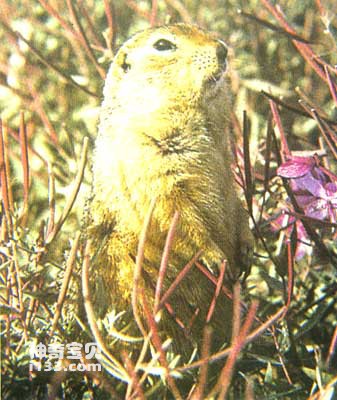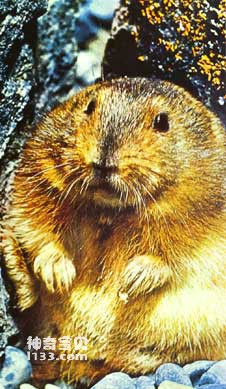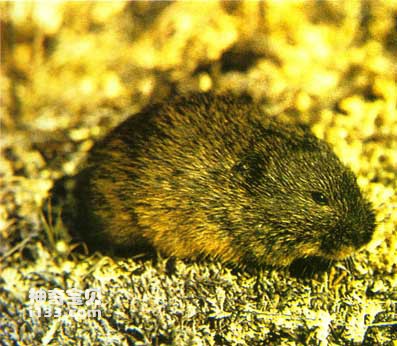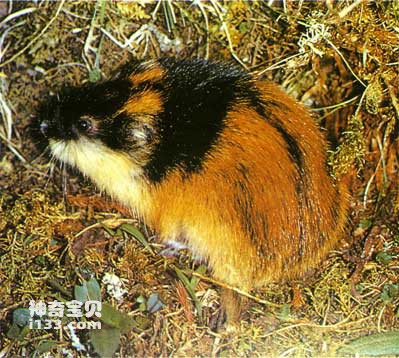Lemmings are mammals that live in the Arctic all year round. They have an oval body shape, short limbs, and are smaller than ordinary mice. They can grow up to 15 cm. They have thick and short tails, small ears, and timid eyes. But when forced, When cornered, it will get angry and fight back. The Eskimos call it the animal from the sky, and the Scandinavians call it the "sky rat." This is because in certain years, their number will increase greatly, just like heavenly soldiers and generals, suddenly descending.

Vigilant Lemmings< /span>
Lemmings have a strong reproductive capacity. A female lemming can give birth to 6 to 7 litters a year. The newborn lemmings can mate 30 days after birth (the highest record is that they can mate 14 days after birth). After a gestation period of 20 days, they can give birth. Each litter can have 11 lemmings. At this rate, a female rat can give birth to thousands of offspring a year.

To make it easier to dig holes in winter, lemmings grow a layer of cutin on their front paws in autumn, like two shovels.
Adapted to a high level of fecundity, lemmings consume an astonishing amount of food in order to replenish the energy they consume during reproduction. They can eat twice their own weight in one meal and have a wide range of food habits, including almost all grass roots, grass stems and moss. All Arctic food is included in its diet, and it can eat 45 kilograms of food a year. Therefore, people jokingly call lemmings "fat and busy harvesters."

Lemmings foraging for food
Lemmings have many natural enemies, such as owls, skuas, snow ospreys, arctic foxes, polar bears, etc., which all feed on lemmings. A pair of snowy ospreys and their offspring can eat up to 100 lemmings in a day. Even herbivorous reindeer will kill lemmings, trample them to death with their hooves, and then eat them, which can be regarded as improving their lives.
The mystery of the "great death migration" of lemmings
In normal years, lemmings only reproduce in small numbers, causing their numbers to increase slightly or even remain the same. Only in good years, when the climate is suitable and food is sufficient, will they work together to reproduce in large numbers, causing their numbers to increase dramatically. Once they reach a certain density, such as hundreds per hectare, a strange phenomenon occurs: at this time, Almost all the lemmings suddenly became restless. They ran around, made endless noises, and stopped eating, as if a disaster was imminent and the end of the world was coming. At this time, they are uncharacteristically uncharacteristic. They are no longer timid and run away when they see people, but on the contrary, they are fearless and fearless in front of any natural enemies. Sometimes they will even take the initiative to attack, fearing neither heaven nor earth. Even more incredible is that even their fur color has changed significantly, from gray and black for concealment to orange for obvious targets, in order to attract the attention of natural enemies to devour and consume them more. At the same time, they also showed a strong sense of migration, gathering together and gradually forming a large group; first they were running around, like a rush before departure, and then they would move in a certain direction when given an order from someone unknown. , Starry night, running wildly away, and the sea is always their final destination. What's interesting is that when they carry out this great death migration, they always leave a few of their kind to look after the house and take on the sacred task of passing on the family line to prevent them from becoming extinct. All of this seemed to have been well thought out and carefully arranged.

Transform into orange lemmings to attract predators
In the spring of 1985, hordes of lemmings marched into the Norwegian mountains. Wherever they went, vegetation was plundered, crops were eaten to a mess, and livestock were bitten. The plague of lemmings has caused great losses to the local area, and people are worried about this. However, in April, this army of lemmings suddenly headed straight for the northwest coast of Norway at a speed of 50 kilometers a day. When they encountered a river, those walking in front jumped into the water without hesitation, building a "rat bridge" for those who came after. ; When encountering a cliff, many lemmings will automatically huddle together to form large meat balls, and roll down bravely. The injured ones will die, while the living ones will continue to move forward, leaving inexhaustible traces along the way. The corpses of numerous lemmings. In this way, they crossed mountains and waded into rivers, marching forward bravely, one after another, along a straight route until they reached the sea, still without fear, they jumped in one after another and swam forward until completely annihilated.
As for why lemmings committed mass suicide, although scientists have conducted a lot of observations and research, they still have different opinions and cannot come up with a convincing explanation.
animal tags:
We created this article in conjunction with AI technology, then made sure it was fact-checked and edited by a Animals Top editor.